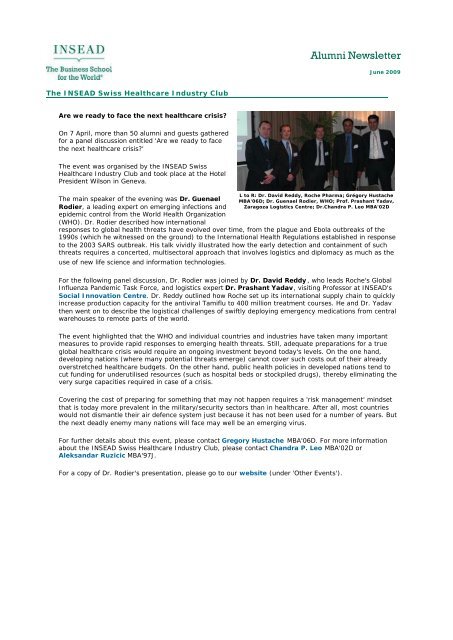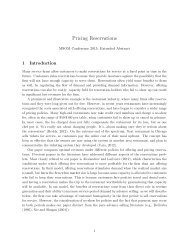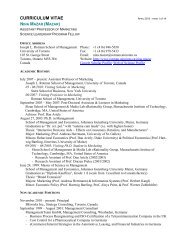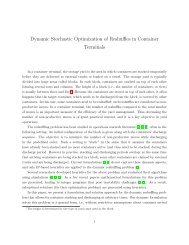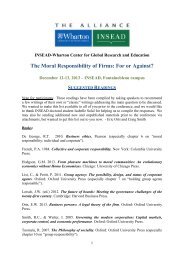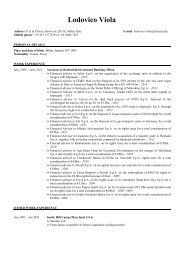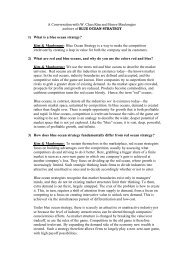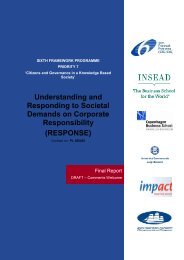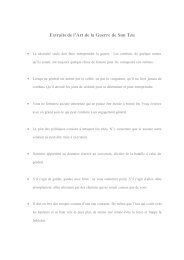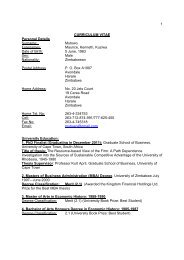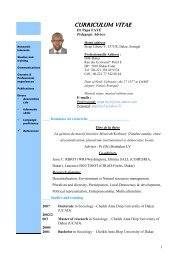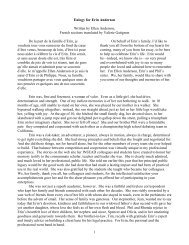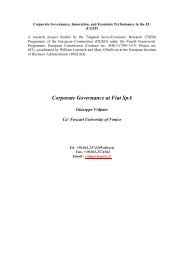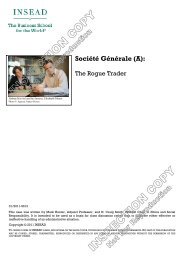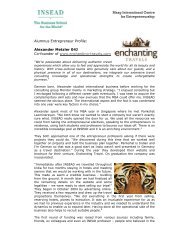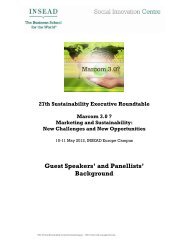Print this newsletter (pdf) - Insead
Print this newsletter (pdf) - Insead
Print this newsletter (pdf) - Insead
You also want an ePaper? Increase the reach of your titles
YUMPU automatically turns print PDFs into web optimized ePapers that Google loves.
The INSEAD Swiss Healthcare Industry Club<br />
Are we ready to face the next healthcare crisis?<br />
On 7 April, more than 50 alumni and guests gathered<br />
for a panel discussion entitled 'Are we ready to face<br />
the next healthcare crisis?'<br />
The event was organised by the INSEAD Swiss<br />
Healthcare Industry Club and took place at the Hotel<br />
President Wilson in Geneva.<br />
The main speaker of the evening was Dr. Guenael<br />
Rodier, a leading expert on emerging infections and<br />
epidemic control from the World Health Organization<br />
June 2009<br />
(WHO). Dr. Rodier described how international<br />
responses to global health threats have evolved over time, from the plague and Ebola outbreaks of the<br />
1990s (which he witnessed on the ground) to the International Health Regulations established in response<br />
to the 2003 SARS outbreak. His talk vividly illustrated how the early detection and containment of such<br />
threats requires a concerted, multisectoral approach that involves logistics and diplomacy as much as the<br />
use of new life science and information technologies.<br />
L to R: Dr. David Reddy, Roche Pharma; Grégory Hustache<br />
MBA'06D; Dr. Guenael Rodier, WHO; Prof. Prashant Yadav,<br />
Zaragoza Logistics Centre; Dr.Chandra P. Leo MBA'02D<br />
For the following panel discussion, Dr. Rodier was joined by Dr. David Reddy, who leads Roche's Global<br />
Influenza Pandemic Task Force, and logistics expert Dr. Prashant Yadav, visiting Professor at INSEAD's<br />
Social Innovation Centre. Dr. Reddy outlined how Roche set up its international supply chain to quickly<br />
increase production capacity for the antiviral Tamiflu to 400 million treatment courses. He and Dr. Yadav<br />
then went on to describe the logistical challenges of swiftly deploying emergency medications from central<br />
warehouses to remote parts of the world.<br />
The event highlighted that the WHO and individual countries and industries have taken many important<br />
measures to provide rapid responses to emerging health threats. Still, adequate preparations for a true<br />
global healthcare crisis would require an ongoing investment beyond today's levels. On the one hand,<br />
developing nations (where many potential threats emerge) cannot cover such costs out of their already<br />
overstretched healthcare budgets. On the other hand, public health policies in developed nations tend to<br />
cut funding for underutilised resources (such as hospital beds or stockpiled drugs), thereby eliminating the<br />
very surge capacities required in case of a crisis.<br />
Covering the cost of preparing for something that may not happen requires a 'risk management' mindset<br />
that is today more prevalent in the military/security sectors than in healthcare. After all, most countries<br />
would not dismantle their air defence system just because it has not been used for a number of years. But<br />
the next deadly enemy many nations will face may well be an emerging virus.<br />
For further details about <strong>this</strong> event, please contact Gregory Hustache MBA'06D. For more information<br />
about the INSEAD Swiss Healthcare Industry Club, please contact Chandra P. Leo MBA'02D or<br />
Aleksandar Ruzicic MBA'97J.<br />
For a copy of Dr. Rodier's presentation, please go to our website (under 'Other Events').


